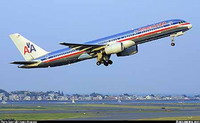US aviation spending bill makes flights more secure
U.S. airlines and airports will provide passengers stranded by long delays with food, water and other basic amenities under an aviation bill.

The legislation also demands that plans be drawn up to allow passengers to deplane following excessive delays and makes clear that the Transportation Department can levy civil penalties against a carrier or airport that doesn't adhere to contingency arrangements.
"These provisions are going to set a standard that will ensure that the flying public will be treated appropriately when they experience delays," said Rep. Mike Thompson, a Democrat who promoted the passenger bill of rights.
The $68 billion (48.4 billion EUR) bill to finance Federal Aviation Administration operations and invest in airport improvements over the next four years passed 267-151. The Senate is working on similar legislation as the current FAA act heads for expiration at the end of this month.
The White House issued a veto threat for the House bill, saying it "falls far short" of administration proposals put forth early this year to reduce delays by modernizing the air traffic control system. The White House also objected to the bill's intent to raise aviation fuel taxes as a means to pay for new investment.
The measure would increase the jet fuel tax for noncommercial planes from 21.8 cents per gallon (3;.8 liters) to 30.7 cents and the aviation gasoline tax from 19.3 cents to 24.1 cents. It would also raise the cap on fees airports can charge passengers for capital improvements from $4.50 (3.20 EUR) a flight to $7 (5 EUR).
But lawmakers, among the legions of U.S. frequent fliers, were particularly interested in aspects of the bill dealing with airport congestion and delays.
Ways and Means Committee Chairman Charles Rangel, a Democrat whose committee signed off on the tax measures, said there was not anyone from either party who "didn't believe that this was our time to tell these aviation people that we passengers were suffering in such a way that we were going to express it through the tax system. People on the tarmac for three, four, five hours. Flights being canceled, weather conditions we never heard of, overcrowding."
The bill specifies that carriers and large and medium hub airports must file emergency contingency plans detailing food, water, restroom facilities, cabin ventilation and medical treatment for passengers aboard aircraft. The water must meet standards of the Safe Drinking Water Act.
An amendment by Rep. Ron Klein, a Democrat, orders the secretary of transportation to investigate consumer complaints in such areas as flight cancellations, overbooking, lost baggage or incorrect fare information.
The bill addresses noise and congestion issues by committing $13 billion (9.2 billion EUR), $1 billion (710,000 EUR) more than the administration request, for air traffic control improvements and the satellite-based Next Generation Air Transportation System.
It requires the FAA to begin schedule reduction meetings if aircraft operations exceed hourly maximum arrival and departure rules and sets up a pilot program at five airports to develop and test new air traffic flow management technologies.
Among other provisions, the bill:
-Allows pilots who now must retire at age 60 to fly until age 65 under certain conditions.
-Requires all civil subsonic jets under 75,000 pounds (34,000 kilograms) to meet tougher noise level standards within five years.
-Increases the number of aviation safety and runway inspectors.
-Tightens security at overseas repair stations.
Subscribe to Pravda.Ru Telegram channel, Facebook, RSS!


